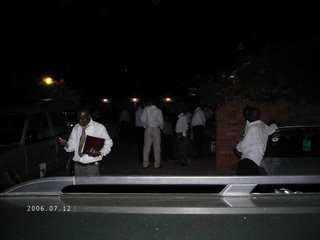
Last week, I ended my first piece wondering whether the so-called middle class that (is perceived to) exist(s) are the “foot soldiers” of a westernization process. This calls into question whether there is a middle class?
If we operate from the assumption that a middle class comprises professionals—either tertiary or secondary-schoool-educated—we can already conceive of a middle class in this country. There’s a good bunch that is
regularly in the news for going on strikes! However seeing as their pay is nothing to write home about, it is often easy to consign them to the “working class” whose income is just a bit over a dollar-a-day.
If they are truly the footsoldiers, then it is because they have taken on board certain precepts that are, in my view, unique to the West. Self-discipline is one of them.
How far Accra residents are self-disciplined is a question for the sages; my experience has been, thus far, a rather ambivalent experience.
Take driving. If it is anything to go by, I can whole-heartedly state that Accra residents fall seriously short. Much blame for this indiscipline is usually attributable to a particular class of “Accrarians”—
taxi and tro-tro drivers. Interestingly enough, these are often barely-educated people for whom, it can be argued, self-discipline on the roads is a luxury.
That said, there is a huge swathe of Accrarians who are considered middle class by where they live—
Spintex Road /
Baatsona / Teshie-Nungua /
East Legon – and by the jobs they do – banking workers in financial institutions; ICT companies; journalists—yet probably drive just as badly as the former group.
Anecdotal evidence suggests the middle class generally is law-abiding: they renew their driving licenses regularly, drive cautiously; pay off their loans on time. I wouldn’t know how true this is, as I haven’t done research on this, but I can say there’s a general perception that they are mild-mannered and refined.
Contrast that with the commercial drivers whom the police often catch for not renewing driving licenses. Many a time, I have had a taxi-driver leave me rather rudely and crudely at a point away from my intended destination, because the police were checking identification somewhere further up the road. Additionally, these drivers drive badly, with little observation of road signs and regulations.
Take this black-and-white argument further, and you are likely to blow the westernization process to smithereens. This is because the human condition, in my view, is such that you are likely to find
as many bad drivers who also delay in renewing their licenses among the middle class as you are to find in the so-called working class.
Generally, Accra residents are law-abiding. They are, however, lawless, because rules and regulations are not implemented in the manner they should be. These include
lighting of roads for purposes of safety; drivers of all types
using unapproved routes; coaches over-speeding—and over-taking—private cars on high-speed roads, thereby creating unnecessary traffic.
When you look at the latter—important elements for any developing society—you get to wonder why there is this degree of lacuna in the implementation of laws?
As regards the ubiquitous
sachet water, the less said, the better!
Few middle class Accrarians use sachet water; the trend, and indeed the fashion, is for those with a bit more disposable income to buy bottled water.
The battle between sachet and bottled has become a perennial one because very often, the environmental ramifications are immense: sachet water is littered all over the metropolis of Accra; bottled water not.
In the first place, this is because it is a bit difficult to litter with bottles: they can be used and re-used; sachet water not.
If I believe there to be a battle, then we can theoretically assume it to be analogous to one between the working and middle classes. The former—ostensibly badly-educated on the importance of maintaining a healthy and clean environment—litter, whilst the better-educated, as expressed through the middle classes—ought to know better.
However, the often do not, for even with regular garbage collection practice in Estates perceived to be populated by a middle class, there are cases where, in an attempt to avoid paying monthly dues, these residents add their garbage to other resident’s or, simply, litter the Estate elsewhere.
With an issue as nettlesome as this, it begs the question whether it is truly a middle class that are the foot soldiers of a process of westernization, which, in my view, includes the implementation of laws.
Then again, what do we say about the
crusade-like attempts by Accra mayor
Stanley Adjiri-Blankson to clothe taxi-drivers in uniform and emboss their cars with visible security numbers.
Today, even if the uniforms are nowhere near the bodies of taxi-drivers in the metropolis, at least most of the taxis are embossed—and all this was done within three months of an announcement to do so!
Decongestion of the metropolis has revealed parts of Accra (Central Business District) rather free of hawkers, as well as regular monitoring by
authorities of AMA.
In my view, this is clearly an indication that laws can be followed through and processed. But surely, this should
be the norm in any society—and not the exception? To praise the exercise excessively is to give an impression that Accrarians cannot do rule of law, or regulation—without being considered an “obroni”, or westernized.
Next, I’ll be looking at how far Accra has gone to becoming a rules-based society, and how far regulatory agencies, such as
Environmental Protection Agency (EPA),
Food and Drugs Board (FDB), Securities and Exchange Commission (SEC), National Communication Authority(NCA) have been working in creating and enforcing some type of discipline in the mentality of residents of Accra.









